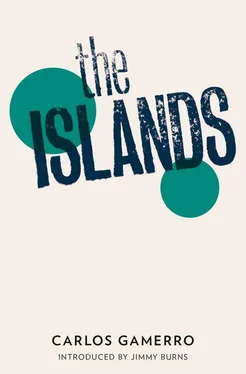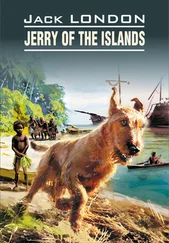My reactions came in layers, like one birthday present wrapping another and another and another: the skin outside becoming a carapace, fancying itself less vulnerable, the throat itself threatening to drown us, tongue rigid, wooden, stopping us talking; beneath it, the pointless alarm bells of adrenaline, maddening in the immobility and impotence of mere prayer: let the bomb fall a little further off, not bury us alive, let it hit some other hole; deeper inside, the flesh and viscera twisted in pain, head throbbing, the nausea churning furiously in an empty stomach; even deeper, all the hatreds, guilts, regrets and accusations of imagination and memory, the furious search for real or invented culprits, the urge to die, the abject promises to a God that, if he ever looked at us, would be zapping to another channel in His boredom — and finally, the long-awaited tiny present at the core: a fear so pure and perfect that a single drop falling on the surface of the soul annulled your identity and conquered your fear of death, because at the point of impact you stopped praying ‘I don’t want to die’ to beg the last, tiny alms of existence: ‘Yes, I do, I do, but not here. Not like this.’
Some time later the English must have occupied the surrounding hills, because the land bombardments began, no longer to a timetable, and we never went out other than to find something to eat, follow some order (ever fewer) or take a dump. We began to become part of the foxhole, we couldn’t imagine being separated from it, like those worms that spend their whole lives in tubes at the bottom of the sea. Our human form had morphed into that indiscriminate crust: hunger, cold and fear had secreted a second skin, a callus of leather, canvas and metal that covered us like a carapace. Would we be able to shed it when this was over, and would there be a new pink skin beneath, the kicking and wailing of a newborn? Or would it all be one and, on tearing it off ourselves, we’d be left like a skinned sheep, our eyes bulging, twitching in our death throes? If this was the crust of a pupa spending the winter underground, what kind of insect would emerge come the spring? What metamorphosis might await the larvæ that writhed in the open wounds of the earth? We’d almost stopped talking to each other; we passed each other like shadows, our fixed gazes passing through the bodies, always focused far beyond, at the point where parallels meet. A sergeant whom we’d christened Wally Walrus once came looking for men to haul some boxes of ammunition (they weighed as much as a man at the start of the war; now, as much as two) and Rubén left the foxhole to beg him to kill him: kneeling on the ground he shouted at him ‘Come on, you fat prick, kill me, you fat queen, eh? eh?’ and the fat slob, eyes like blind moons, backing away going ‘No, no, go back to your post, soldier’ with both hands, and Rubén advancing on his knees ‘You fat fuck, you’re no use even for that, kill me, kill me,’ and in the end the sarge turned and legged it, his big arse wobbling, and Rubén goes ‘Why won’t they kill me?’ and there’s Carlitos dragging himself over to him and dragging him back into the foxhole. He was always the strongest. We all leaned on him and the weight threatened to knock him over: his shoulders sagged and his skin hung off him like wet clothes from the pegs of his cheekbones. But it was he who had the best chance of coming through alive and in one piece, he who had most right to survive. And he probably would have, had the English been the only threat, had Verraco not been there too. I swore at myself mentally for having come, for having had so much to drink, for having believed that the accumulated fright of the last few days could be neutralised by the fright that surrounded me. Now I was condemned to remember.
The day had dawned clear, perfect for sheep-hunting, and after opening our eyes to the first ray of sun (I don’t say waking up, because by that stage we never slept at night) we got up, making the frost that soldered our ponchos to the ground crunch. Carlos and I, the only ones with anything left, went, or rather fell, down the mountain. The sheep turned out to be wilier than usual (or we were clumsier from our exhaustion) because, zigzagging, it dodged something like five shots and when it finally went down, it did so on the inside of what looked very much like a minefield. The beast thrashed about there, trying to stand up, and I grabbed Carlos by the arm, but he wriggled free and, treading as if he were crossing a rotten wooden bridge, approached till he could reach one outstretched leg. When he was at my side, carrying the sheep on his shoulders, I reeled back when I saw the thick, black blood oozing from its nostrils like blackberry jam. We’d killed so many by then (sometimes with a knife) that it seemed ridiculous at this stage to be shocked, yet the sadness that flooded through me when I saw the hanging head of the dead sheep, coupled with the oppressive sense of foreboding pouring from the rarefied blue sky and the stillness of the yellow grass, was so strong that it tore the sobs from my chest.
‘Leave it,’ I think I said, softly, and then ludicrously: ‘Let’s go home.’
Carlitos had started walking, the sheep slung over his shoulders.
‘What?’ he shouted to me without turning round.
‘Let’s go home,’ I repeated, even more softly, and then I followed him.
He lugged it all the way by himself, the last stretch in his arms like a baby, covered with his jacket to hide it from view (Wally Walrus, especially, seized all the packages and rations that reached us whenever he could; the bastard was getting fat on this war). The sheep kicked and writhed when Chanino and Rubén skewered it to skin it, and we realised that it had only been half-dead all along. ‘That’s why I didn’t want to give it to you, it was still nice and warm,’ smiled Carlitos. Judging by the light, it must have been about four in the afternoon, and we hadn’t had anything to eat since midday the day before yesterday; only with difficulty, due to the pain in my hands, did I approach the recently opened sheep and with the others plunged my fingers into the warmth of its guts. We stood there like that for a while, without saying a word or looking at each other, until the numbness abated and we could feel our fingers again. When he got his breath back, Carlitos got up to go and see Hijitus. He was lying at the bottom of the foxhole, wrapped in wet canvas, and had gone dead. Not even the smell of the lamb beginning to roast brought any reaction.
He was the only one. The two Cordobans had emerged from their cave, sniffing the air like hairy armadillos, and came to sit on some rocks that marked the boundary of our territory. After a while four blokes from the forward positions also came over: the wind was blowing their way. They sat down to wait. But our unwelcome guest dropped in just as the first slices (we carved it up as it roasted) were ready to eat. Like a lion lolling nonchalantly towards a pack of hunting dogs, Verraco arrived with his faithful Wally Walrus on a leash.
‘Sergeant, confiscate that animal illegally slaughtered by your troops.’
Had the bastard at least been as hungry as we were, it would have been understandable: the survival of the fittest. But no: his boots were polished and his body generously filled out his warm, dry uniform. No, the fucker was just passing through and had caught a whiff that had whetted his appetite (that word, here!) before dinner and came over and said it’s mine and ‘Fetch’ to Wally Walrus.
‘No,’ said Carlitos and took the safety off his FAL.
Wally Walrus realised immediately what was going on, and his whiskers and chubby, stubbly cheeks started trembling. But Verraco was slow to cotton on.
‘Not ready yet?’ he asked innocently, scrutinising the barely seared meat. ‘Not quite.’
Читать дальше











